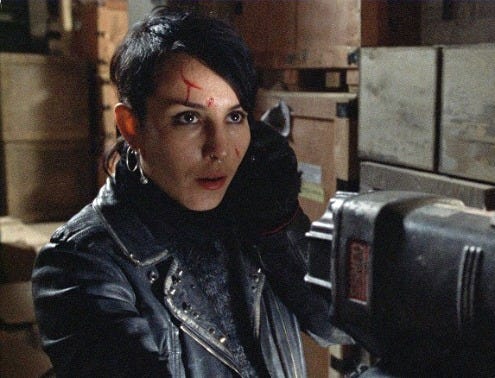The Girl Who Kicked the Hornet's Nest

The Swedish trilogy about Lisbeth Salander, a brilliant but disturbed woman striking back at a system that abused her, trundles to a wobbly finish with "The Girl Who Kicked the Hornet's Nest." The final installment is heavy on plot and cheap theatrics, but light on the dark, mesmerizing energy that made the first film so watchable.
Noomi Rapace is back again as Lisbeth, now in custody for the attempted murder of her father (Georgi Staykov), a former Soviet agent who defected to the West and became a shadowy merchant of arms and information.
The main thrust of the story builds to her trial, and Rapace is given very little to do over the film's overlong 2½-hour run other than stay in her hospital bed recovering from a gunshot wound to the head, or fidget in a prison cell.
Journalist Mikael Blomkvist (Michael Nyqvist) is back at the center of the action after being somewhat sidelined in the last movie. Lisbeth previously saved his bacon, and now he's out to return the favor, digging into the sordid past of shadowy government figures and their lackeys who want to see her declared criminally insane.
Mikael wants to publish the whole grimy tale in his magazine Millennium -- which is also the name of the trilogy of books by late author Stieg Larsson upon which these films are based -- but his partner/lover Erika (Lena Endre) gets cold feet when the government thugs ratchet up the threats.
The film tries unsuccessfully to balance a burgeoning array of characters and plot lines, ladling on complexity without adding clarity.
There's Ronald Niederman (Mikael Spreitz), a hulking blond giant who is literally impervious to pain. He's also Lisbeth's half-brother, and is out to make her pay for what she did to daddy. He doesn't say a word the entire movie, but shows up every 20 minutes or so to randomly kill somebody so we'll remember how scary he is.
A group of ex-government spies in their 70s return to active duty to cover up their administration's nefarious dealings with Lisbeth's father. Of course, it's not long before they decide she's too much of a liability to let live.
Blomkvist gets unexpected help from a shadowy organization calling themselves Constitutional Defense, who are supposedly investigating the first shadowy group on behalf of the current government.
Blomkvist's sister Annika (Annika Hallin) is tapped to be Lisbeth's attorney, which she does adeptly, though she's perturbed at her client's unwillingness to show Blomkvist any appreciation for sticking his neck out so far for her.
Peter Teleborian (Anders Ahlbom), the nefarious psychiatrist who committed Lisbeth to an institution when she was 12, returns as the prosecution's star witness.
The film's ending is strange and truncated, as Lisbeth and Blomkvist reach what is obviously the end of their journey together. While I grant that a big mushy Hollywood finale wouldn't work in the more restrained Swedish mode, the conclusion goes beyond minimalist to emotionally vacant.
If this pair can't even think of anything notable to say to each other by way of farewell, it makes us wonder why we bothered watching them for three movies.
3 Yaps



